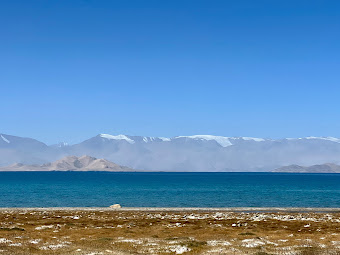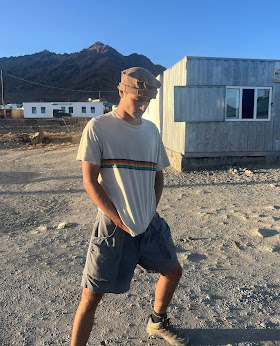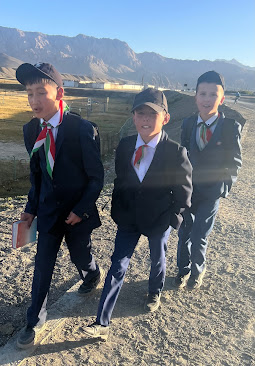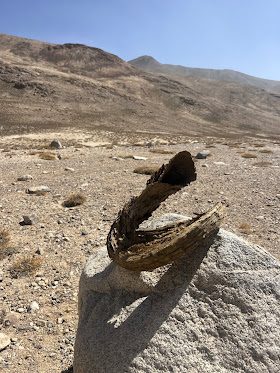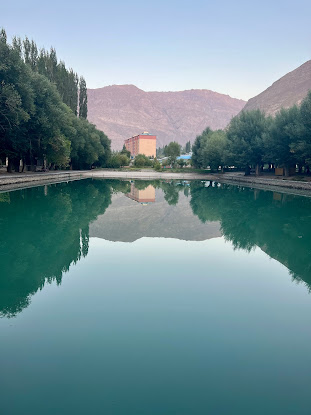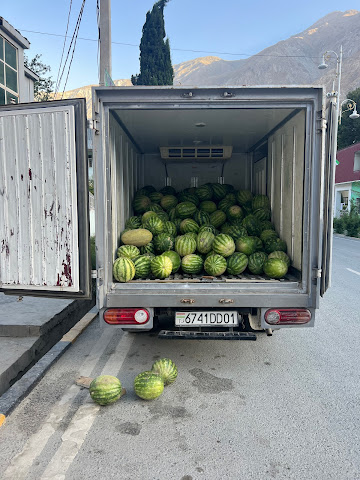Saturday, October 7
Roof Of The World 28
We descend to the Karakul lake (4,300m), the highest in Central Asia, where Eitan and I both swim (bracing and clean). It is salt water and nothing lives here, unlike the pike found in the Yashikul late and Bulunkul lake which we passed earlier (note: 'kul' means lake). The small nearby village of 200 population where we have tea survives on tourists attracted to the beauty of this location.
As with all places we have travelled so far there are electrical sockets (European prong) to charge our iPhones and power the lights; sometimes a television or computer screen is in the guest or dining room but I do not imagine they work. Wifi another matter - mainly touch-and-go.
We blast Steely Dan's "Reeling In The Years" across the expansiveness and everything is right.
at 10:59
Friday, October 6
Kashgar 1997 27
Sonnet, Katie and I visited Kashgar in 1997, before the Chinese systematic genocide of the Uyghur Muslims via re-education camps and torture from 2014. Kashgar, along with its thousands of years history, was once a place where one could barter for a camel, Kalashnikov, or opium (knowing the door markings). I recall 5-gallon drums of fresh chicken guts (very clean) used for cooking, or the row of men being shaved by the barber for prayer - long blade, of course. Always carpets to be haggled over chi in the privacy of the trader's home. Such friendly people.
China's brutality makes no sense - the Uyghurs are no threat to China or its great cities, located thousands of miles East and, anyway, China's western border is protected by the impassable Hindu Kush, Tian Shans and Karakoram ranges. It is strictly an assimilation of a peaceful Muslim people because Beijing can do so, overlooked or unseen outside a few small protests from us, the West.
at 17:50
Defender 26
I meet this friendly couple who have been on the road since June heading from a village in Switzerland to Nepal. They have their sleeping quarters on top of the Defender and a couple of deck chairs to watch the sunset. We don't really get into it but they are in the right place for sure.
at 17:01
Morgab 25
There is a market - Sundays are busiest - and we examine local items and Western scrapings - Coke and Fanta (of course), Colgate toothpaste, dish washing liquid .. bottled water for travellers is a must and clean water is an urgency (in 2002 President Ramon initiated the global Year of Clean Water, adopted by the UN).
Wherever we pass on the highway we see children dressed in clean pressed school clothes, the boys with knotted ties and the girls with tight hair braids - sometimes they are walking many kilometres from the next village, often very young eg under ten years. I am informed that the norm is for local schooling until Year 4 then to a larger town/ relatives to Year 11. Some will then go to Dushambe for university. Unsurprisingly the more school, the less likely to return home. By uni most are interested in some travel, like Macfhadir, and Moscow is a big draw.
at 14:58
Alichor Village 24
Eitan makes a few fast friends in a scratch game of football. Shouts of Messi! and Ronaldo! can be heard by the ten or so boys as they shoot on goal and trash-talk each other.
We stay at a guesthouse run by the family matriarch Rahima, the former (stern) local english teacher for ages 4-11 (her English to be desired). Rahima's grandchildren run about spreading joy. They are dirty and loved.
at 10:54
Aziz 23
He knows many drivers along the way, honking or waving or stopping to chat about conditions ahead or whatever. At night he reconnects with his friends and they lie on their bed mats and pass the night away talking and drinking chi.
at 08:15
Kargush Pass 22
Along with the lonely beauty of the place is the temperature. While today it is a very pleasant 25C, in January the needle will drop to -60C, the coldest point in Central Asia (along with weather meters and some solar panels there is a large satellite dish). For a nearby comparison of extremes, Dushambe will hit 50C in the summertime.
at 08:01
Thursday, October 5
Wakhan Corridor 21
The Russians say, "you have not seen the Pamir Mountains until you have been to the Wakhan Corridor." People here are mainly from Pakistan and Afghanistan, and have their own dialect (Makhfdir informs). They are known for their striking blue eyes and blond hair. Similar to the unseen brown bear or snow leopard, which roam these mountains, they stay away from us, having no interest in such visitors to their home.
Aziz's local music is a constant in the background. We negotiate for Eitan's play-list and try to explain Bob Dylan's "Like A Rolling Stone" and "Tom Thumb's Blues"; he and Makhfidr are less convinced by bands Deer Hunger, LCD Sound System and the Sufian Stevens.
The shopkeeper, below, is well stocked including Budweiser, something not seen since London. The local beer, Sim Sim, is 4.7% (reported) alcohol content and sold only in 2L plastic bottles for 30 somone - less than a dollar. It is very good when cold and safe to drink, while the tap water is advised not.
at 15:47
Flour 20
Hindu Kush means "killer of Hindus."
at 11:24
Engles Peak 19
We trek upwards from Zong valley, c 3,000m, in the Wakhan Corridor, by a river irrigation to an alpine lake at the base of the mountains: Engels peak (6,500m), Moskovski Pravda peak (6,075m), Karl Marx peak (6,300m) and LGU peak (6,222m). Each capped by white glaciers breaking the endless brown lunar vista of the empty and desolate Pamirs. Around a bend, outside our view, is Lenin peak (7,200m).
On the 24km hike we pick up a healthy dog - I name him Mushka - who follows us to the lake rewarded by salami, salty sardines and hard bread. Mushka ditches us for the next hikers and all in a days work for his meal, I am sure.
At the lake I meet a solo Serbian and ask him about the Balkans. He is 42 and informs of being in grade school as Yugoslavia dissolved in 1995 and bodies lay in the street and man-of-wars flew over-head. Milosovik ? who disregarded NATO and, as a result, Serbia was bombed by NATO to prevent more genocide in 2002 - "He was a pawn in the operation and manipulated (by Serbia, I think). All countries were doing bad things in the war". NB Croatia is Catholic, Serbia Orthodox, Bosnia Muslim and the Balkans' seven country lines imposted upon them post Second World War creating a tinder box for conflict, which ignited following the collapse of the Soviet Union.
at 11:15
Wednesday, October 4
Zong Village 18
It is not lost on me that this crew is equally interesting to Eitan, looking forward 10 years, as me, seeing a younger generation in thought and action.
at 17:01
Lada 06 17
The Soviet cars on the highway, almost always white, are sometimes moving or left on the side of the road. Many of these vehicles, and certainly the earlier Ladas, date to the 60s and 70s, and were the workhorses of the era. They are more romantic than the orange Hyundai trucks that are now here to take from the mountains (and sometimes make our passing tenuous).
I have seen the Russian car roofs stacked a story high with wheat since the harvesting season has begun.
at 07:50
Tuesday, October 3
Qah Qaha 16
The fortress was built in the 3rd century to protect Ishkashim during the Arabic period. This area connects Afghanistan to India, a key trading route for clothes, spices and knowledge on the ancient Silk Route.
The fortress stones are from Afghanistan, transported across the Panj River. A similar fortress, from the same period and with the same name, is in Afghanistan 1,000km from here. The rulers of both fortresses were brothers - Zangibor was their family name - and they provided protection for the price of crossing.
At the base of the fortress we engage a vendor who sells beads, cloth and local jewellery. We bartar a few things and Eitan walks away with an Afghani hat called a 'pakol'.
We meet a young hostess at a hot-springs - the mineral water is 50C after being cooled to this temperature by mixing with another mountain stream. I receive her permission for a picture - difficult to take photographs of women, I have found.
at 09:42
Pamirs 15
We race the sunset's elongating shadows as the road winds its way to the Wakhan Corridor. We see the snow capped Hindu Kush for the first time, the massif towering overhead, in the far distance.
at 09:25
Russia 13
at 09:14
Botanical Garden 12
Eitan meets four local men one playing guitar. He is invited to join and plays a blues song for them. "They found it a bit weird", he says.
at 08:14
Gamatkhona 11
Practicing Shia pray every day, seven-days a week, at 4am and 6pm, filling the mosque with men and women who pray together (unlike Sunni). Eitan and I would be hard pressed in service at this early hour though not far off from the swimming practice of my youth.
Unlike Sunni, who pray five times a day, there is no call to prayer, which is so haunting in Sunni Muslim cities.
Shia: "the Muslims of the branch of Islam comprising sects believing in Ali and the Imams as the only rightful successors of Mohammad and in the concealment and messianic return of the last recognised Imam."
at 08:06
Makhfird 10
at 07:46
Monday, October 2
Khorog 9
Eitan and I breakfast at the hostel on a quiet Sunday morning. We awake stunned, per normal, and the coffee, everywhere, is Nescafe and sometimes the water is hot - but, in all fairness dear, it does the trick.
On the TV screen behind me is a kick boxing fight and Eitan and I discuss the uncivilised nature of this violent sport - even boxing aims at some gentlemanly nature with gloves, if not worn in Tajikistan. Adding to the noise is the Tajik music which pumps beats around the room - to me, it sounds of of chanting prayer mixed to synthesizer rhythms - the patrons pay neither TV nor sound any notice. Last night a group of Russians smoked and drank at the bar and it is hard to imagine they are welcome here, now, but they are served and we do not join them.
Macfadir enjoys music but has never heard of The Beatles. Or The Rolling Stones. I ask, who then ? And her Western canon is complete with Madonna. What songs? "Frozen", which happens to be from my favourite Madonna album "Ray Of Light".
Aziz points out his house as we drive through Khorog and I tell him he is a rich man. He replies, "I am a rich man because I have three daughters." (translated by Macfadir)
at 16:25
Tajikistan 8
Today is Independence Day in Tajikistan, dating from 1991 following the collapse of the Soviet empire. In Dushambe there are fireworks and military parades; in Khorog, where we are, there is nothing to report, just another day of living.
After the collapse of the USSR, and from May 1992 until 1997, the Tajik Civil War devastated the country as regional groups rose up against the elected President, Ramon Nabiyev, who remains President today and whose image is posted everywhere we travel. Against him, the rebels included liberal democrat reformers and Islamasists, supported by the Russian military. An estimated 60,000 to 150,000 people were killed with 20% of the population displaced - there was indiscriminate killing mainly in the southern region, our route this pas week - it is hard to imagine given how freely people here give their hospitality.
at 09:23
Pamirs 7
Today we drive to Geisev Valley and cross the Bhartan river on a rickety footbridge, fast-flowing water feet beneath us. From here we trek to Bhagoo village, about 8km, to an upper series of clear lakes in a valley of towering mountains. We stay the night in Geisev, a small village of simple houses, gnarled trees and fruit groves - it is the season and appleas and pears fall from the branches; blankets of orange apricots sun-dry on the stones. Eitan and I count seconds on each on in the 4C river which we swim.
I learn that a Pamir house is built as a family effort instead of, say, buying off a neighbour. It takes about one year to collect all the materials needed for construction. As wood is rare here and the centrepriece of the house is wooden pillars, family planning demands long-term tree-planting.
Furniture is simple and the home protected with warm carpets and wools on the floor and walls.
Our room has a hole in the ceiling for a make-shift chimney.
at 08:57
Taliban 6
Aziz grunts as he points out a Taliban check point.
The Taliban ruled most of Afghanistan from 1996-2001 until the Americans knocked them out. It began as a student led revolution (Taliban means "students") from the 1994 Afghanistan civil war and spread in the Islamic schools - it was Mullah Omar who shifted the movement away from the Mujahideen warlords into a form of government espousing an extreme interpretation of Islamic law ("Sharia") which resulted in massacres against Afghan civilians, harsh discrimination against minority religions and people, denial of UN food supplies to starving people, banning women from school, and the destruction of cultural monuments.
In 1997, our trip to Pakistan leading us into the mountainous Northern Territories was nearly killed as the Taliban destroyed the ancient Budha statues of Afghanistan and their nomadic armed camps, and refugees, spilled into the region alongside the KKH, triggering fear that all of Pakistan could be next.
The Taliban did not disappear during the American occupation, retaking Kabul following the US departure in 2021. The Taliban is not recognised by any country and likely supported by China, Russia and Iran and others.
at 08:42
Sunday, October 1
Tajikistan 5
Nate does not trust the government generally and his eventual terminus may be Mexico or Panama - he reasons their leadership is so incompetent it cannot be dangerous. My impolite suspicion is that Nate is running for something quite possibly more than growing up.
at 18:35
Saturday, September 30
Tajikistan 4
The small village is next to towering mountains and the sometimes raging c 970km Panj River which drains the Sarez Lake, itself filled by glacier melt, in the Bartang Valley. The river is the natural border separating Tajikistan and Afghanistan. Remarkably, it dissolves into the desert. Before it goes, though, water is siphoned to the cotton fields, Tajikistan's major export, since the Aral Sea went dry (watering cotton) during Soviet times.
But the Pamir Highway : it is a c 1,800km two-lane (sometimes) road that begins in Termez, Uzbekistan, and ends in Osh, Kyrgyzstan. Pre highway, the route was an important part of the Silk Road connecting East and West.
The present hw began in 1931-35 under Stalin to transport troops and provisions and maintain his control here. Over many years, sections were upgraded to concrete or tarmac but, from around Kalai Kumb, it is mostly a dirt and rock road making for brutal driving. Along with holes and ditches, we are 1-3 feet from the road's edge dropping downwards to the battleship grey river below. Impassable without a 4WD.
My original plan was to cycle the hw, which I now see would have been dangerous and foolhardy. Firstly I cannot service a bike which is certainly an essential requirement. Then there are the passes over 3,000m.
As we drive I note the Chinese are in the midst of bouldering and eventually, I learn, will pave the full hw, expected to finish by 2025. Payback is the minerals and precious metals that can be delivered more rapidly to Kashgar than Eastern China where the people are. Chinese orange trucks, driven by Tajiks, create impasses and Aziz honks, curses and races around them without changing a facial expression, which is normally glowering (though he is extremely friendly)
As trucks approach there is a game of chicken between drivers (Aziz) dictated by the smoothest passage on the road - is a broken axel from a pothole less inconvenient than a collision ?
at 16:33
Tajikistan 3
at 15:58



